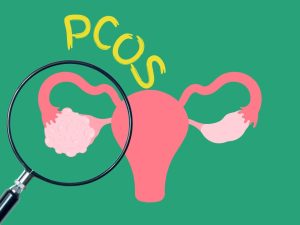

What is PCOS?
-
- Poly cystic ovary syndrome (PCOS) is one of the most common health problems in childbearing aged females. It is related to hormonal disturbances seen in elevated androgen levels, male sex hormone that usually is present in females in small amounts. Multiple cysts (fluid- filled sacs) can also be present in the ovaries, producing more androgen and affecting the ovulation ability, leading to irregular periods, acne, thinning scalp hair, and excess hair growth on the face and body. Women with PCOS usually have insulin resistance, weight gain and family history of the same condition.

How to treat PCOS?
-
- Treatment of PCOS depends on multiple factors. Your doctor will give you the medication regimen that will suite your condition and goals best. Lifestyle changes, weight loss, physical activity, stress management and sleeping pattern and quality, all play important roles in improving your PCOS condition. It was reported that lifestyle changes appear to influence the restoration of ovulation and regular menstrual cycles and increased the pregnancy rates in overweight or obese anovulatory patients with PCOS
- Nutrition & PCOS:
- A major part of PCOS treatment is related to the dietary habits and lifestyle of the patient. Lifestyle modifications (including diet, exercise, sleep, and so on) are regarded to play roles in the development of PCOS by regulating insulin sensitivity and keeping the weight balanced as well as governing normal androgen production. It is important to avoid myths and seek advice from a clinical dietitian in regards to your food choices. The following tips will help you reach your goal:
- Weight reduction and management is found to be the first step toward improving PCOS is overweight and obese patients.
- Carbohydrates: Low carbohydrate diet (< 45%) resulted in body mass reduction and improvement in cholesterol levels in PCOS patients. Cutting carbohydrates completely is not recommended rather than improving the quality of carbohydrates consumed. Carbohydrates are a major source of energy providing 4 kcal per gram. Quality of carbohydrates increases with their complexity as it will take longer for the body to break it down to its simple form “sugar” for absorption and transporting to cells. Complex carbohydrates sources are wide and can be found in a great variety of foods such as:
- Whole grains: brown rice, whole wheat pasta and bread, quinoa, whole bulgur, whole oats
- Legumes: lentils, chickpeas, beans
- Fruits: focus on those rich in antioxidants such as berries
- Starchy vegetables: corn, peas, pumpkin and potatoes
- All these sources are rich in fibres which enhances your blood sugar control.
- Protein: To maintain a healthy body composition your muscle mass should be in normal range. Muscles need proper protein intake and physical exercise to be built. Protein comes from two sources: animal and plant. Animal protein includes: meat, chicken, fish, eggs, and dairy products. While plant-based protein is more limited to legumes and some grains as quinoa. Your protein intake should make up to 30 % of your calorie intake.
- Fat: It is also important to monitor your fat intake especially the source of it. Reduce intake of saturated and trans fat and increase your intake from natural sources rich in omega 3 and omega 6 such as olive oil, raw nuts, avocado and fatty fish. Make sure the portions you take is within your calorie requirements as each gram of fat yields 9 kcal.
- Along with the above-mentioned dietary management, it is important to maintain proper hydration through adequate water intake. Below are the other important changes you need to make to help improve your PCOS:
- Be active. The minimum aerobic activity is recommended as more than 150 min per week, including intensive exercise for more than 90 min
- Limit caffeine intake
- Green tea daily
- Limit use of artificial sweeteners
- Soy milk can help in fertility
- Manage stress- Ashwagandha supplements help
- Use organic foods when possible as it helps improving your fertility
- Limit plastic use, replace with glass
- Common vitamins and minerals deficiencies are: Vitamin D, B 12, and Zinc get them check and replaced when deficient
Inositol supplements helps you to regulate your periods- follow your doctor’s recommendations
Related Treatments
Frequently Asked Questions
Request an appointment
Please complete the details and we will book you shortly.
